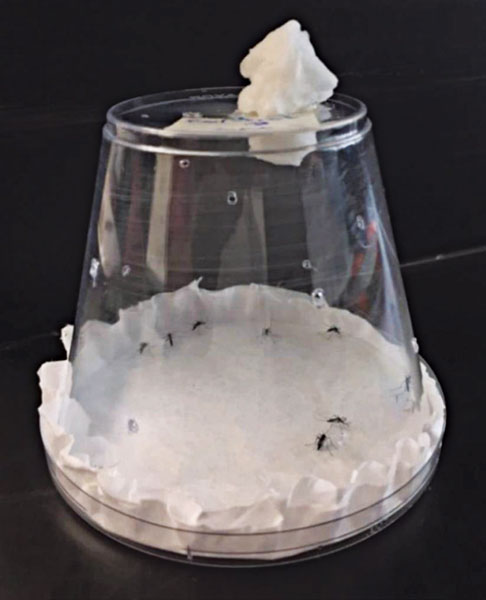
The laboratory study consisted of a bioassay chamber constructed of a Petri dish base, a product-treated filter paper nested in the dish, and a ventilated polystyrene cup with sucrose solution wick. It contained 15 non-blood-fed, five- to seven-day-old female Asian tiger mosquitoes. PHOTO: ANASTASIA MOSQUITO CONTROL DISTRICT
It’s time to take a closer look at the use of botanical-based treatments for mosquito control, new research concludes.
A study recently published in the Journal of the Florida Mosquito Control Association confirms some findings of earlier research Nature-Cide conducted to demonstrate its product’s efficacy on mosquitoes and other pests.
Nature-Cide All Purpose Concentrate features the dual active ingredients of 0.5 percent clove and 0.5 percent cottonseed oil. It is exempt from the Federal Insecticide, Fungicide, and Rodenticide Act (FIFRA) Section 25(b), and is labeled for use on furniture, bedding, food processing accounts, and more. The product is labeled for a variety of pests — including bed bugs, cockroaches, spiders, fleas, ants, ticks and mosquitoes.
This new study, carried out by three members of the Anastasia Mosquito Control District in St. Augustine, Fla., focused on product efficacy specifically against the Asian tiger mosquito (Aedes albopictus), which can carry West Nile virus, dengue fever and Chikungunya, to name just three public health concerns.
The Anastasia team reported that in the study’s laboratory tests — where low, mid and high rates of the product were applied under controlled conditions — Nature-Cide had a 20 percent to 50 percent knockdown at the low rate; 100 percent knockdown at mid and high rates, and a mean mortality of at least 90 percent at all rates by Week 8 (four weeks post treatment).

The field sites were selected based on the presence of suitable harborages for Asian tiger mosquitoes, such as moderate to dense foliage, adult mosquito resting areas, and artificial containers for the development of immature mosquitoes. PHOTO: ANASTASIA MOSQUITO CONTROL DISTRICT
Under the field trials portion of the study, the team reported an 80 percent net reduction in mosquito collections by Week 8 — four weeks post-treatment — at the low rate. With mid-rate applications, the study reported the sites treated with Nature-Cide had 90 percent net reduction in mosquito collections four weeks after treatment. The study did not allot for time with high-rate applications.
“The positive results using Nature-Cide as an outdoor residual treatment in this study demonstrate that botanically based formulations are ready to be investigated further, and possibly incorporated operationally into mosquito control programs,” concluded the study’s authors.
Leave A Comment